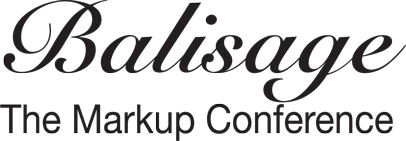Balisage Tag Set and Submission Guidelines
Since Balisage is a conference about markup technologies, we are fortunately able to depend on our authors to encode their own papers for publication. This enables us to publish full conference proceedings, producing a substantial record of research in the field over time, affordably and sustainably. We provide schemas and stylesheets in support of this. Authors who for any reason are unable to encode their papers or have them encoded should let us know, and we will try to connect you with someone who can help.
All papers must be submitted using the file naming conventions described below. Please cite your file name in all correspondence about the paper.
Tag set and schemas
The Balisage Tag Set (a small subset of DocBook V5) is available in DTD, XSD, and RNG forms. The constraints expressed in the different versions are equivalent. If you have questions about the tag set or how to tag Balisage papers please let us know. Suggestions for improvements are also welcome.
- Balisage Tag Set
- Balisage Tag Set Documentation
- XSLT stylesheets for formatting and displaying Balisage papers, including CSS and XSLT for authoring, as well as a Proceedings preview stylesheet.
Please ensure your paper is valid according to one of these schemas before you send it to us. Submissions that are not valid XML:
- Reflect poorly on the author, suggesting lack of understanding or care;
- Irritate the conference committee; and
- May be returned to the author for cleanup.
If you have trouble downloading a schema, let us know and we’ll email it to you (tell us which one you want).
Note: The conference committee decided on DocBook V5 as the basis for our encoding because DocBook is well known in our user community, and even markup practitioners who have not used it can learn it easily. We have also made the Balisage Tag Set as small as we could, with the intention that it be as easy to use as possible. This tag set is not the same as any used for any other conference or publication; please do not send your paper marked up with another tag set. (Those may be better in many ways, but we have the infrastructure to deal with papers using this tagging.)
File naming
For publication, files will be renamed using controlled identifiers, but we ask that you help us avoid problems and confusion by observing the file naming convention here, which is designed to reduce the chances of name collisions while still making files easily recognizable as we work with them.
Please send your paper in a file named BalYYYYnameMMDD.xml where
| BalYYYY | Indicates that the submission is for Balisage YYYY. (Bal2012 for Balisage
2012.) |
| name | The first four letters of the submitting author's surname. If your surname is less than 4 letters, just use the complete surname. |
| MM | A two-digit number. (We suggest the month of your birth or of another significant date you will remember - we aren't trying to steal your identity; we are trying to create identifiers.) |
| DD | Another two-digit number. (We suggest the day of your birth or of another significant date you will remember.) |
For example, when Yankee Doodle (born July 4) submitted a paper to Balisage 1776, he assigned it the file name Bal1776dood0704.xml.
Any graphics should be named BalYYYYnameMMDDNN.xxx where NN is a two-digit number, and xxx indicates the format of the graphic: .jpg for jpeg images, .png for PNG images.
Submission
Please zip (compress) all files (XML-encoded text and images) for your submission into one file (using a PKZIP-compatible compression utility). The zipped file should be named BalYYYYnameMMDD.zip following the convention just described.
Deliver your paper via email to info@balisage.net.
Please do not send unzipped submissions; there are many ways in which email applications can "enhance" uncompressed XML files, and sorting out the mess is time consuming. If this is difficult for any reason, or if attaching your submission to an email presents any problems, please contact us at info@balisage.net before the submission deadline so we can accommodate you.
Followup
When we receive your paper we will email you to acknowledge the submission within one business day. If you do not receive such acknowledgment please assume your paper has gone astray and re-send or call us.
All submitting authors will be notified whether their papers have been accepted. Accepted papers should be revised in light of peer reviewers' comments and submitted again by the final deadline, following the same guidelines. At the same time, authors must provide us a signed publication agreement licensing us to publish the paper in the conference Proceedings (to appear under the copyright you assign it), as described in the Instructions for Authors.
